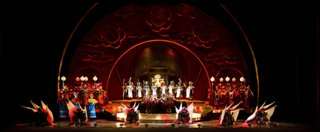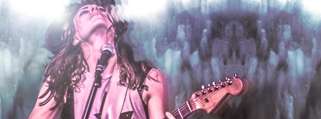|
Back
Traveling from the Subway to the Himalayas New York
New York
01/05/2019 -
Gerald Lynch Theater, New York
January 12*, 13, 2019
Andrea Clearfield: Mila, Great Sorcerer
Lauren Flanigan, Eve Gigliotti, Will Liverman, Matthew Gamble, Tobias Greenhalgh, Aaron Blake, Susannah Biller, Musa Ngqungwana, Jonathan Blalock (Performers)
The Knights and the New York Virtuoso Singers, Manoj Kamps (Conductor)
Kevin Newbury (Director), Greg Emetaz (Video design), Lucrecia Briceno (Lighting), Darrell Thorne (Tableaux design/choreography), Andrea Mincie (Costumes), Gene Kaufman (Sets)

Andrea Clearfield returned to the Himalayans and its musicians who had introduced her to Tibetan musical traditions. She played the music she had created for Mila, Great Sorcerer, her new opera. The Himalayan people greeted her warmly. In her music, they said, she had created a bridge between the West and Tibet.
Hearing and seeing the work staged at the Gerald Lynch Theater as part of the Prototype Festival gave Westerners a chance to cross over too. The libretto by playwright Jean Claude van Itallie, known for his Tibetan Book of the Dead among other significant works, and Lois Wald, the multi-faceted poet, retells the story of Milarepa, who had taken the journey from darkness into enlightenment in the 11th century.
The composer and librettists had met serendipitously at the Rubin Museum, which celebrates the art of the Himalayas, India and neighboring regions. Van Itallie and Wald had been working on Milarepa’s story as had Clearfield. In a matter of seconds they agreed to collaborate.
Art from the Rubin Museum was available to them. Paintings are projected on the rear wall of the stage. Silhouettes of the tableaux performers in elaborate headdresses march across the screen and come to life at the end of the opera.
Mila was born into a wealthy family When his father died, he and his mother were left at the mercy of a wicked aunt, sung with a gutsy, cruel mezzo by Eve Gigliotti, a Wagner Ring regular and also a contributor to new music in opera’s like Nico Muhly’s Dark Sisters. Mother is sung by the iconic Lauren Flanigan, in whose dramatic soprano lurks motherly love and the drive of desperation
Sent to Sorcery School, Mila develops tools to wreck vengeance on his aunt and uncle Aaron Blake, an accomplished young singer with a strong lyric tenor and the ability to move from an enraged cruelty to redemption, sings Mila.
In Act II, Mila finds the great translator Marpa and tries to persuade him to adopt him as a student. Hulking Musa Ngqungwana grips the Marpa role in his barreling bass baritone and drives us crazy. He demands Mila demonstrate his seriousness by building a round house, then a square one, on and on, destroying one house after another. Finally Marpa takes on his ‘heart son’ and Mila works through to enlightenment.
The production is a work in progress. Yet much is made of the stage, including a ramp which leads up a mountain and symbolically also provides path to learning. Demons were dressed in green, yellow, white and blue. Headdresses were varied and elaborate.
The libretto is complex and lovely. Words sit well in the voice and the music. Lines like “Snowflakes kiss the fallow fields,” and “The wind is whispering to you, listen to their sounds, listen to the stillness all around you,” only begin to suggest the evocative spell that is cast.
The music appropriates folk songs with the quarter tones and clashing symbols of the East. Courtly rhythms and melodies abound. The Knights gave a sensitive performance of the score. Of special note was the harpist Bridget Kibbey, who often led the melodic lines, but also offered symphonic textures on her instrument.
The work succeeds in delivering its redemptive message at the Prototype Festival in very American New York.
Irondale, Brooklyn
January 5, 7*, 8, 9, 10, 11*, 12, 2019
Michael Joseph McQuilken: The Infinite Hotel
Leah Siegel (Jib), Joe Trombino (Gary), Laura Gragtmans (Marris), Daniel Reece (Ben), Tommy Schrider (Turner), Jennifer Harrison Newman (Telly), Austin Durant (Hoarder), Marianna Hoitt-Lange (Angie)
Firehorse & the Few Moments (Music and Lyrics), Amanda Palmer & Jason Webley (Select songs)
Freddy Epstein (Musical direction)
Jon Morris (Creative direction), Maruti Evans (Production design), Josh Higgason & Maxx Berkowitz (Video design), Nicholas Pope (Sound design), Oana Botez (Costume design), Eric Farber (Percussion design), Tyler Gilstrap (Choreography)

Many of the Prototype operas emerge from personal experience, induced or accidental. The Infinite Hotel by Michael Joseph McQuilken fits this mold, yet its unique origins grow out of street art. McQuilken began as a street performer and some of his collaborators did too. This musical drama erupts from the street. Yet it feels like an opera. It is through composed, remarkable for a work in which three disparate stories are interwoven seamlessly.
A mother’s midnight sexual dalliance drives her young teen daughter from the house out onto the street where she was hit by a car. The girl lives on in the here and now or perhaps in an alternate universe. A duo who met in a subway station develops wild pop music. A classical pianist, a celebrity at 11, is killed by a street sweeper truck while he is walking. His death is network news. The guilty mother and the driver of the street sweeper meet at a 12-step-type recovery meeting for guilty people.
The music of this ‘opera’ is mostly popular and includes new songs by Amanda Palmer & Jason Webley. Reference is made to Felix Mendelssohn and Beethoven. We hear a bit of Mendelssohn’s music on a creaky record player.
Singers have a wide ranging background. All however have been touched by the classical forms.
Set in a grand space at Irondale in Brooklyn, the audience is poised on stools and chairs on the balcony. On the performing floor, other audience members who have expressed an interest in participating are being directed as part of the action. McQuilken says that a more active audience is part of the future of performance.
A muscular cameraman in black totes an 80 pound camera, recording every moment of the drama. He moves as gracefully as a trained dancer The action he records is projected on screen surrounding the audience, below and above This not only helps us see, but brings the actors up close and personal. The double vision enhances audience pleasure.
Headsets are distributed before the work begins. These give each audience member up close sound. All the singers and instrumentalists are miked and mixed into our ears. The little green lights that flash on the sets when they are set ‘on’ look like green fireflies flitting through the hall. A small orchestral ensemble is perched on a riser at one end of the theater.
The Prototype Festival provides musical dramas for old-fashioned opera goers and newbies alike. Their productions bode well for the future of the form.
Susan Hall
|